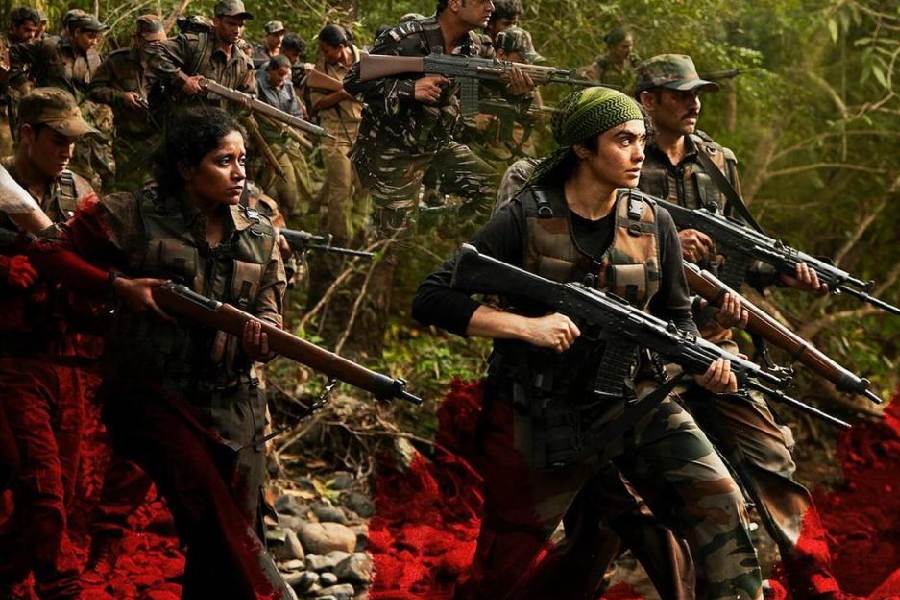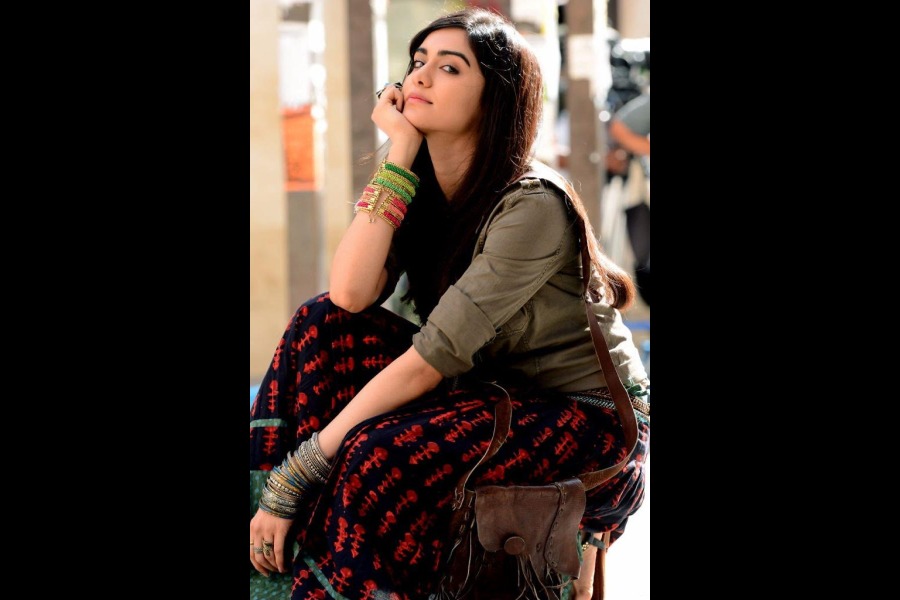Fresh from the stupendous success of The Kerala Story, Adah Sharma joins the same team to play an IPS officer in Bastar: The Naxal Story, which focuses on the cold-blooded Maoist killings of a battalion of CRPF jawans and is based on a real-life incident. A t2 chat with Adah.
Expectations are high from you and the team after the success of The Kerala Story. How do you think Bastar: The Naxal Story will live up to that?
The reaction to the trailer was pretty awesome. The audience hasn't seen me in such a look before. I am quite excited because it has not even been a year since The Kerala Story released in theatres and did such massive business. It was released on OTT in early February and then I had Sunflower Season 2 (on Zee5). They are all very different roles. In Sunflower, I am a glamorous bar dancer and in Bastar, I play a cop. I am fortunate that the audience accepts me in whatever roles I play. Every time I try to do something different, the audience gives me a lot of love. I feel very lucky.

Adah in 'Bastar: The Naxal Story', releasing in theatres on March 15.
You started unconventionally with 1920, which was a horror film...
That is true. It has happened because the audience has accepted me in different kinds of roles. If they didn't, it would have been very difficult for people to cast me. I have pretty much had the audience always on my side. People wait to see if I do something different, whether it is a film, a music video or even a photo shoot. Whoever I have spoken to is excited to see what I bring to my character Neerja in Bastar.
What appealed to you about the film?
I enjoyed working with Vipul Shah (producer) and Sudipto Sen (director) on The Kerala Story. They are incredible people who I enjoy spending time with and working with.
So when they offered this to me, I said that I would, of course, do it. What works for this team is the fact that all of us want to tell the story, we do not have an eye on the box office. Even during The Kerala Story, both Vipul Shah and Sudipto Sen said that their main focus was to bring about as much awareness as they could.
For us, filmmaking is not a competition. It is about narrating stories that touch hearts and have an impact. The only pressure is to creatively do the best that one can. The process then becomes one of joy because you are concentrating on making a piece of art and it is nice to be a part of that.
Bastar has a huge ensemble cast while The Kerala Story was a very intimate film. It was about this girl narrating her story about how she got taken to Afghanistan and then to the ISIS camps. Bastar has many stories running parallelly and everything you see is interconnected. There are poor tribals and the atrocities inflicted on them. There are corrupt politicians with power dynamics. And then there is Neerja. I am thrilled that they have included me in this ensemble.
I wanted to do it because Neerja is a very powerful character. The kind of pressure that she is under, most people — including me — would crumble. But sometimes you don't know your strengths till you are put through a really tough time. You get to know how strong you are only when you are in a very difficult situation.
The makers were very clear that in this movie, they didn't want me to show my vulnerable side. In The Kerala Story, I was very vulnerable and naive. But in Bastar, it is the opposite.
Even when the Naxals kill 75 CRPF jawans in cold blood and everyone is crying in front of their bodies, Neerja is stoic. She is heading a battalion and she knows that if she crumbles, then her whole team will break down. She doesn't wear her emotions on her sleeve.
We also show the atrocities that the tribals in the region have been subjected to. In the film, as well as in the trailer, there is this village woman who talks about her husband being cut into pieces in front of his five-year-old child because he hoisted the National Flag in his own country.
The attack shown in the film took place in real life. What aspects of this story, when you first heard it, shocked you?
How these jawans were butchered... not when they were in battle, but while they were resting after a 48-hour shift. It was a planned attack to kill them, not from enemies outside our country, but from people within the country.
My dad is in the Navy and I feel very close to our armed forces. I felt that if I could contribute in any way to letting the world know about this story, I should do this film.
What were the physical as well as the emotional challenges of playing this part?
Physically, I had to put on weight. I put on about 10kg. But we wanted to put on healthy weight. I had to be very strong. In the film, I had to climb mountains, which was a very tough task. I needed energy, so I ate a lot of bananas and my mom had given me flaxseed laddoos to munch on.
We were shooting in the jungle and we were pretty much living over there. It was four or five hours away from home by road and we didn't come back every day. We were staying there and that was tough.
Also, putting on my make-up took around an hour and a half every day. I am used to doing a 10-minute make-up routine and being ready. But in Bastar, I had to have my whole skin textured to look like I had been living in the jungle. I met the girls from the CRPF camps. They are very strong and their eyes have fearlessness in them.
Certain politicians have been targeted in the film, some educational institutions have been attacked. Did you never think that such a film could alienate a part of the audience and that it would be viewed as propaganda, given that it is releasing so close to the General Elections?
I didn't think of all that because the film is based on facts. All the things that we show in the film are well documented in the public domain and have happened for real. Everyone in the world has access to this information. The fact that these jawans were killed by people of this country is known and we wanted to create awareness among those who don't know about it.
In the next few years, where do you see yourself as an actor?
I don't have a plan as such. I just want to work with nice people, be happy and hopefully be cast in projects in which people see my potential and want to give me nice, challenging roles that I can put my heart and soul into.
Doing Sunflower after The Kerala Story has made many aware of my range because I went from playing a vulnerable girl to a cruel and conniving woman. When I started with horror in 1920, I was told that I would only get roles like that. Thankfully, I have never been bracketed.










